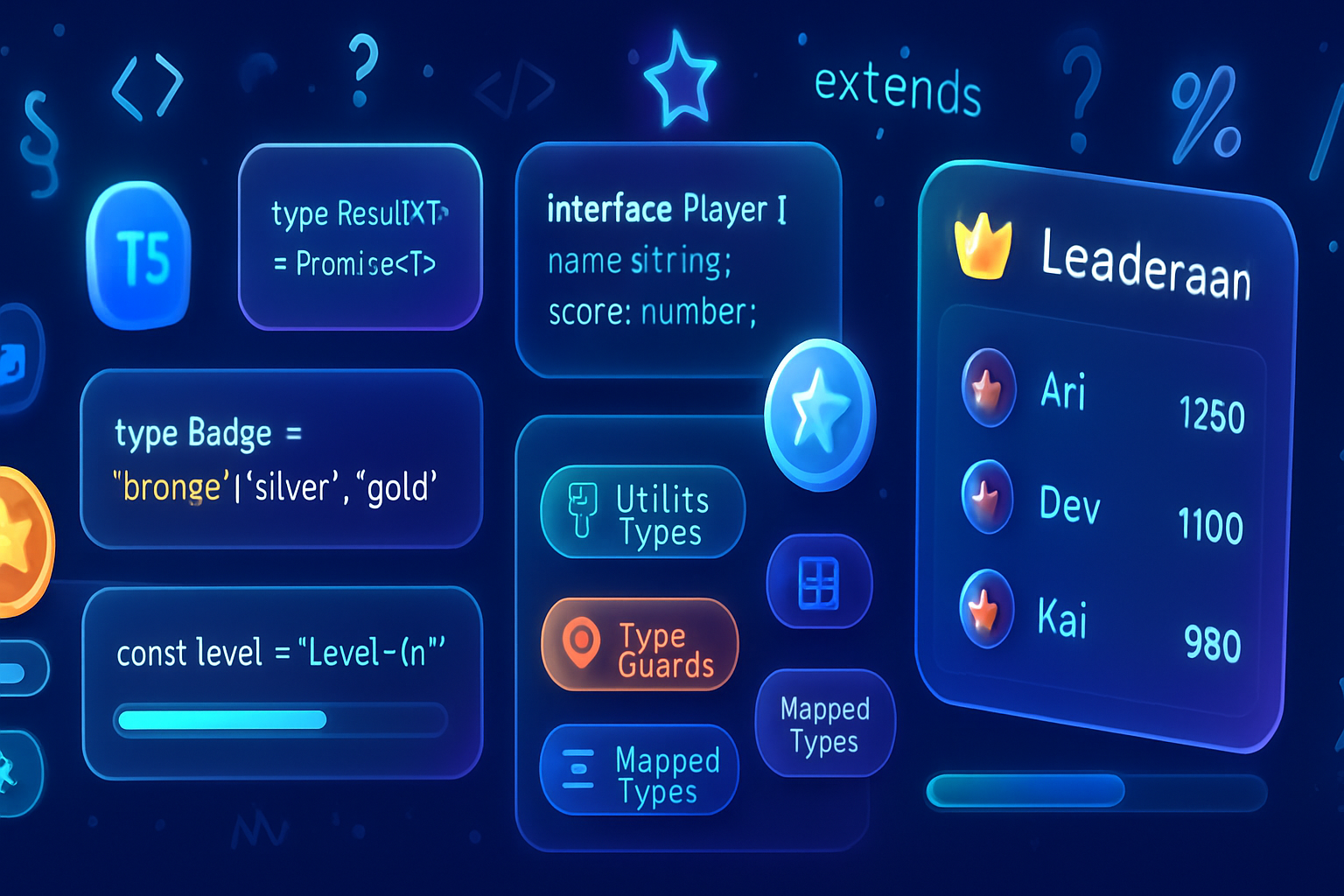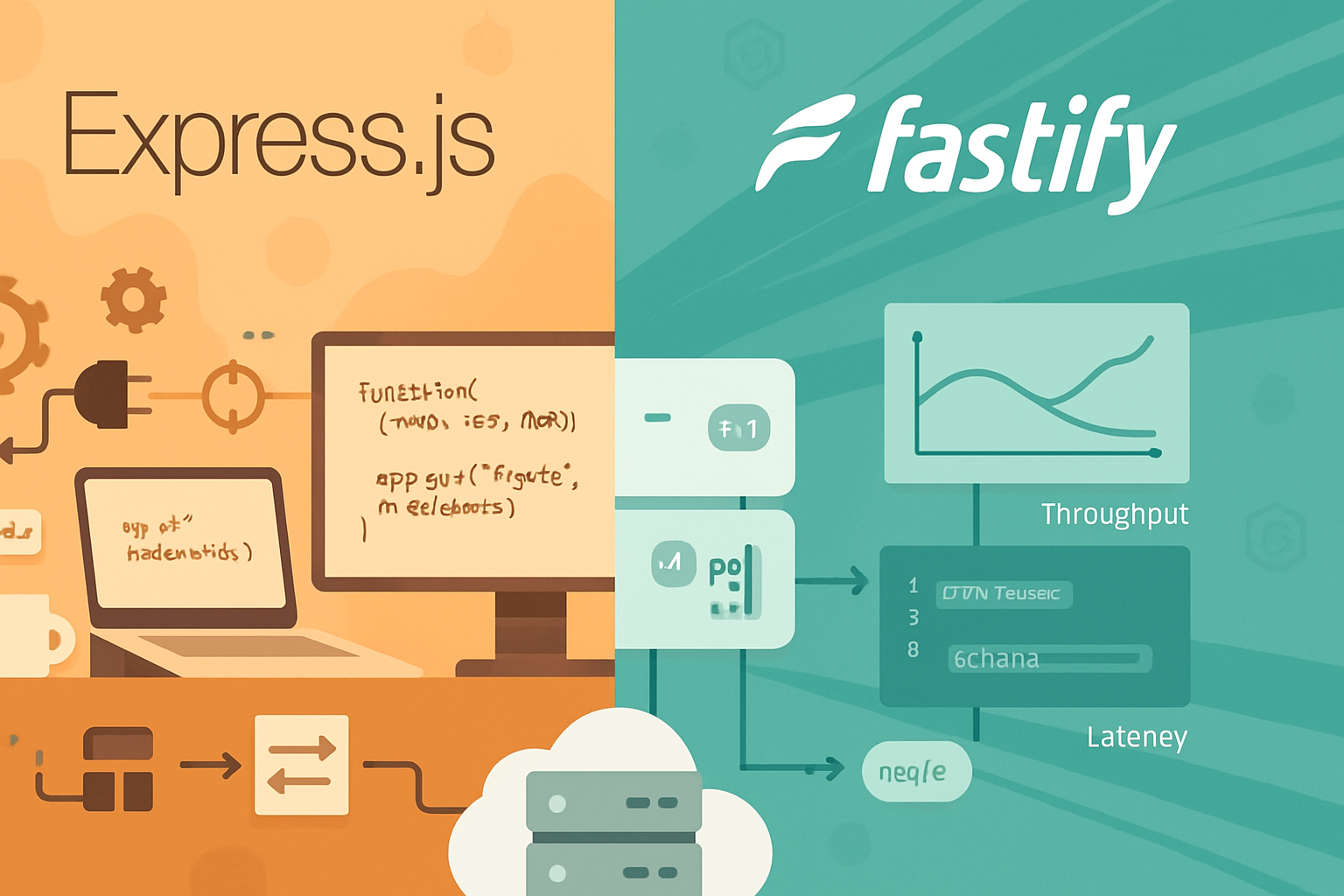· 7 min read
Gamifying Your TypeScript Learning with Innovative Coding Challenges
Turn TypeScript practice into a game. This post presents a progressive set of creative TypeScript challenges - from runtime cleverness to advanced type-level hacks - plus scoring, hints, and solution sketches to help you learn by playing.

Why gamify TypeScript learning?
TypeScript has become more than a typed layer over JavaScript - it’s a playground for clever patterns, expressive types, and even tiny type-level computation. Turning practice into a game makes learning stick: you get instant feedback, measurable progress, and motivation via points, badges, and leaderboards.
This post collects a set of bite-sized, progressive TypeScript challenges that encourage you to explore unusual features and push typical usage patterns. Each challenge includes the goal, example tests, hints, and a solution sketch so you can learn both the how and the why.
Useful references
- TypeScript Handbook - Advanced Types: https://www.typescriptlang.org/docs/handbook/advanced-types.html
- Template Literal Types: https://www.typescriptlang.org/docs/handbook/2/template-literal-types.html
- Conditional Types & infer: https://www.typescriptlang.org/docs/handbook/2/conditional-types.html
- Utility Types: https://www.typescriptlang.org/docs/handbook/utility-types.html
- Type Challenges (community repo): https://github.com/type-challenges/type-challenges
- TypeScript Deep Dive (Basarat): https://basarat.gitbook.io/typescript/
How to use these challenges
- Pick a difficulty level (Beginner → Expert).
- Timebox attempts (e.g., 20–40 minutes) to create tension and focus.
- Score: complete = full points, partial (some tests) = half points, elegant type-only solution = bonus.
- Track completion, time, best solution, and award badges for streaks or creative approaches.
Challenge conventions
- Each challenge includes a problem statement, sample input/output, test examples, hints, and a solution sketch.
- Many tasks emphasize type-only or hybrid (compile-time + runtime) solutions.
- You can implement tests with Jest, Vitest, or ts-node; skeletons below assume a simple assertion harness.
Beginner: “Brand New Identity” - Create nominal (brand) types
Goal: Prevent mixing semantically distinct primitives (e.g., UserID vs ProductID) while keeping runtime as just strings.
Why it’s instructive: Learn declaration merging, intersection types, and the pattern for opaque/brand types.
Task
- Create two branded types,
UserIdandProductId, both aliases forstringat runtime but incompatible at compile time. - Provide helper constructors
makeUserId(s: string): UserIdandmakeProductId(s: string): ProductId.
Example
type UserId = /* your code */
function makeUserId(s: string): UserId { /* ... */ }
function sendGift(from: UserId, to: UserId) {}
const u = makeUserId('u1');
const p = makeProductId('p1');
sendGift(u, u); // ok
sendGift(u, p); // should be a type errorHints
- Use
& { __brand: 'User' }style. - Ensure branded value is still just a string at runtime; use
asin constructor.
Solution sketch
- Implement
type UserId = string & { __brand: 'UserId' }and the constructor returnss as UserId.
Why this matters
- Teaches simple type intersections for stronger invariants without runtime overhead.
Points: 10
Intermediate: “Tuple Transformer” - Map and Filter on Tuple Types
Goal: Create MapTuple<T, F> and FilterTuple<T, Predicate> at the type level that operate on tuple types.
Why it’s instructive: Practice recursive conditional types, infer, and variadic tuple manipulation.
Task
type MapTuple<T extends any[], F>should produce a tuple withFapplied to each element type.type FilterTuple<T extends any[], P>removes elements that don’t match predicateP.
Examples
type T1 = MapTuple<[1, 2, 3], (x: number) => string>; // -> [string, string, string]
type T2 = FilterTuple<[1, 'a', 2, 'b'], number>; // -> [1, 2]Hints
- Use recursion with conditional types:
T extends [infer Head, ...infer Tail] ? ... : []. - For
FilterTuple, checkHead extends P ? [Head, ...FilterTuple<Tail, P>] : FilterTuple<Tail, P>.
Solution sketch
- Map: recursively
Headmapped via helper generic that appliesF- since you cannot pass value-level functions as types, useFas a mapping type (e.g.,F extends (a: any) => any). - Filter: straightforward recursive conditional type.
Points: 25
Intermediate+: “Tiny Type Lens” - Strongly typed property path getter
Goal: Build a Path<T> union of string paths (e.g., “user.name”, “user.address.street”) for a nested object type T, and implement a typed get<T, P extends Path<T>>(obj: T, path: P): PathValue<T, P>.
Why it’s instructive: Combines template literal types and mapped types; useful in real-world form libraries.
Task
- Compute all valid dot-separated paths for nested objects and arrays (arrays may use numeric indices as
"arr.0.name"). PathValue<T, P>should resolve to the property type at that path.
Hints
- Start by implementing path generation without arrays.
- Use template literal types: `K |
type Path
- To compute value, split path by
.using recursive template literalP extends${infer Head}.${infer Rest}? ... : ....
Solution sketch
Path<T>: for each keyK in keyof T, ifT[K]is object, includeKand${K}.${Path<T[K]>}; otherwise includeK.PathValue<T, P>: recursively descend using conditional type onP.
Points: 40 (bonus if handles arrays elegantly)
Advanced: “Type-Level Regex Validator” - basic pattern matcher using template literal types
Goal: Build a compile-time string validator type MatchesPattern<S, P> where P is a simple pattern language with * (any string) and ? (any single character). Type resolves to true or false.
Why it’s instructive: Explores the power and limits of template literal types and recursive string inference.
Task
- Implement
type MatchesPattern<S extends string, P extends string> = true | false. '*'matches any string (including empty),'?'matches exactly one character.
Examples
type A = MatchesPattern<'hello', 'he*o'>; // true
type B = MatchesPattern<'hello', 'h?llo'>; // true
type C = MatchesPattern<'hello', 'h*z'>; // falseHints
- Use pattern splitting:
P extends${infer Head}${infer Rest}“ and recursively match. *is the tricky case - consider branching where*consumes zero or more characters by trying both skipping and consuming.
Solution sketch
- This is doable for small patterns but will get hairy; keep patterns small. Use recursion and conditional union branching for the star semantics.
Points: 60
Expert: “Type-Safe SQL-ish Builder” - guarantee selected columns exist
Goal: Implement a mini query builder that composes select, from, and where in a way that the select fields are validated against the schema for the selected table(s) at compile time.
Why it’s instructive: Combines type-level mapping from runtime values (as const), string literal unions, overloads, and inference.
Task
- Given a schema object typed as const:
const DB = {
users: { id: 1 as number, name: '' as string, age: 0 as number },
posts: { id: 1 as number, title: '' as string },
} as const;- Create
select(db, 'users').columns(['id', 'name']).where({ age: 30 })where columns are type-checked againstusers.
Hints
- When passing string literals at runtime, use
as constso TypeScript keeps literal types. - Use generics to capture table name
T extends keyof DB. columnsshould acceptArray<keyof DB[T]>or a tuple of those keys.
Solution sketch
- Build a fluent API with generic type parameters that carry the current table type. Use overloads or curried generics so the
columnsmethod receives the capturedT.
Points: 100 + bonus for join support
Creative hacks and micro-challenges
These mini-exercises are excellent for quick sprints (5–15 minutes each) and can serve as bonus objectives.
- Opaque numeric units: Implement
Meter,Second, etc., to prevent accidental mixing of units. - Compile-time error messages: Create
Assert<T extends true>()that produces useful diagnostics when assertions fail. - Type-driven form validations: Derive a validation schema type from an interface and create a runtime validator generator.
- EventEmitter with typed events: map string event names to handler signatures and ensure
emitandonare fully type-checked. - Extract the required keys of a type whose properties are optional only if they contain
undefinedin their type union.
Gamification mechanics
- Point system: award points per challenge (see above). Add +10 bonus for test coverage > 80% and +15 for pure type-level solutions.
- Badges: “Type Wrangler” for completing 5 type-only challenges, “Runtime Hacker” for clever Proxy/Reflect runtime solutions, “Full Stack Typist” for a combined runtime+type solution.
- Streaks: daily streak for completing at least one challenge per day.
- Leaderboard: collect JSON submissions with time and points; rank by total points and time-to-first-complete.
Automated testing harness
- Keep tests in TypeScript so you get compile-time failures as part of the CI. Example test runner sketch using ts-node + node assert:
// test-runner.ts
import assert from 'assert';
import * as impl from './solutions/challenge1';
// runtime tests
assert.strictEqual(impl.makeUserId('x').length > 0, true);
// compile-time tests: include special files whose sole purpose is to fail to compile if types are wrong.- For type-only checks, create
.tsfiles intests/compilethat intentionally assign incompatible types; the CI step runstsc --noEmitand fails if the types don’t match expected errors.
CI idea: run tsc --noEmit, then run runtime tests with node -r ts-node/register tests/runtime/*.ts.
Scoring and leaderboard storage
- Use a simple REST endpoint (or GitHub Gist) to accept JSON submissions: { user, challengeId, points, time, solutionUrl }.
- Validate solutions manually or via automated test harness.
Community and challenge sharing
- Encourage forking and publishing elegant solutions; add a “spotlight” for creative approaches.
- Use the Type Challenges repo for inspiration and to contribute new problems.
Wrap-up and learning tips
- Focus on pattern familiarity: repeated exposure to
infer, conditional types, and template literal types builds intuition faster than memorization. - Mix runtime and type-level puzzles to keep sessions fresh: when tired of type gymnastics, switch to a runtime Proxy or decorator challenge.
- Keep a “challenge journal” with quick notes about what you learned and alternative approaches.
Further reading
- TypeScript Handbook: Advanced Types - learn the core building blocks: https://www.typescriptlang.org/docs/handbook/advanced-types.html
- Type Challenges Repo - hundreds of curated puzzles: https://github.com/type-challenges/type-challenges
- Basarat’s TypeScript Deep Dive for advanced practical patterns: https://basarat.gitbook.io/typescript/
Happy hacking - and may your type errors teach you new tricks!

